Canadians may be super polite and always saying sorry, but they won’t apologize for their sizable real estate bets: The country is the largest investor in the U.S. market most years, and The Real Deal’s first-ever event in Canada brought the biggest players from both countries together for a day of education, networking and plenty of deals.
The event, held at the Sony Centre in Downtown Toronto on March 30, kicked off with an intimate Q&A with Michael Wekerle, investor and star of “Dragons’ Den” (Canada’s “Shark Tank”). True to character, the “King of Bay Street” took the stage sporting a tan three-piece suit with a pocket square and yellow socks, and donned silver Ray-Bans which he never took off.
“I spend a lot of money on shoes and clothes now because I didn’t have it as a kid,” he told branding expert Tony Chapman, who asked the investor questions about his career, his comfort with risk and his real estate bets.
Removing “fear and greed” from the investing equation is paramount, Wekerle said. He spoke about his decision to cash out of his big 2008 bet on the South Florida housing market, explaining that his “exit formula is based on a 3x return.” South Florida is an area he remains bullish on, he said, noting that “you cannot replace beachfront. Location location location.”
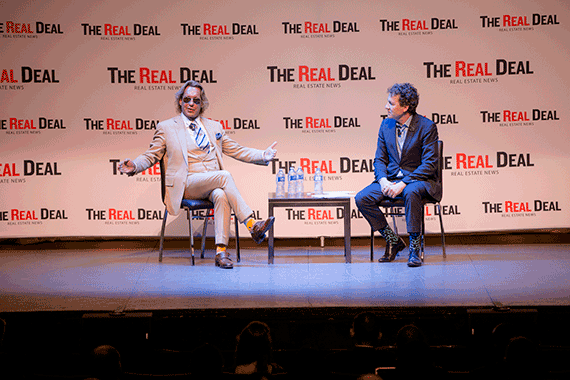
From left: Michael Wekerle and Tony Chapman
Between the panels, attendees checked out the latest projects being marketed by Related ISG, Douglas Elliman, ARX, Magic Development, Freed Development and Pemberton Group.
Next up was a discussion on South Florida real estate, which brought on stage some of the industry’s leading authorities on that market: Carlos Rosso of the Related Group; Dev Motwani of Merrimac Ventures; Gil Dezer of Dezer Development; Jay Parker of Douglas Elliman Florida; and Mark McLean of the Toronto Real Estate Board.
Moderated by TRD’s Editor-in-Chief Stuart Elliott, the panel focused on some of the latest trends in South Florida development and Canadian activity there. Elliman’s Parker said that despite the relatively weak loonie, Canadian buyers were still asserting themselves.
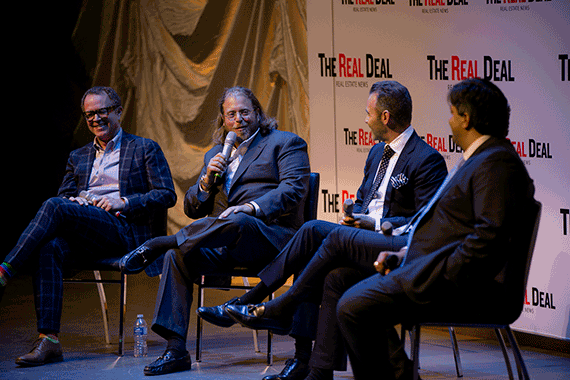
From left: Mark McClean, Gil Dezer, Jay Parker, Carlos Rossi and Dev Motwani
“There have been more luxury buyers from Canada at 70 cents than ever before,” he said. Rosso said that though the market was healthy, developers were no longer pricing as exuberantly as they had been in 2014 and 2015.
“Today you can get much better deals than two years ago,” he said. Dezer said whetting Canadian appetites for South Florida real estate was simple: Target them in the winter months, and “show them a picture of a palm tree.”
Parker and McLean spoke of the need for South Florida brokers to work far more closely with their counterparts up north.
“We have never powerfully connected the broker community in South Florida to the community in Toronto, which is a missed opportunity,” Parker said. Because of high commission splits in Canada, it’s been tricky to collaborate in the past, but the effort was important so that both sides could establish trust.
“Wrong answer,” Dezer said. “They [Canadians] are going to buy anyway without you, so make sure you’re there.”
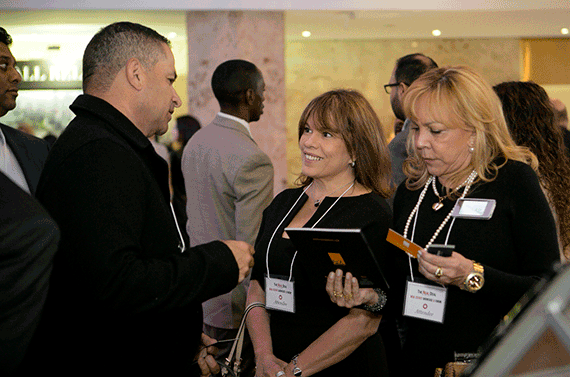
Attendees in discussion at The Real Deal’s Toronto event at the Sony Centre
The final panel discussed big-picture trends in the U.S. real estate market, with a focus on opportunities in New York and other gateway cities. JDS Development Group’s Michael Stern, who’s developing 11.5 million square feet between New York and Miami, talked about the extraordinarily high barriers to new condo development in New York, from unaffordable land to a spike in construction costs.
Sharif El-Gamal of Soho Properties, The Developer Behind 45 Park Place in Tribeca and the Dream Hotel in Times Square, said that “luxury has become a taboo word” in New York, but it was important to separate sentiment from the facts. “If you look at 2007-2008, we haven’t even come close to that supply” of luxury product in this cycle, he said.
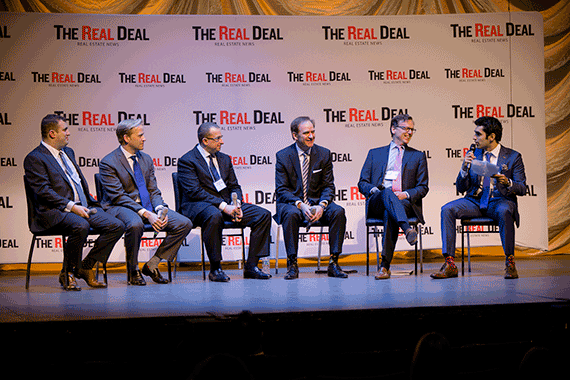
Michael Stern, J.D. Parker, Sharif El-Gamal, Phil Soper, Rick Rush and moderator Hiten Samtani, discussing investments in residential and commercial markets in key U.S. cities
Rick Rush of Hodges Ward Elliott noted that despite a 30 percent growth in the supply of hotel rooms in New York, occupancy rates were still hovering around 85 percent. He addressed the Airbnb effect, saying that the short-term rental behemoth was, at most, pushing hotel occupancy rates in New York down by just 1.5 percent and mostly affecting hotels offering lower price points. Other major hotel markets such as San Francisco, Miami and Los Angeles were also enjoying high occupancy rates, he said. And some emerging markets, such as Nashville, Austin and Denver, “are on fire,” he said, with “jobs following people instead of people following jobs.”
Phil Soper, CEO of Royal LePage, one of Canada’s oldest and largest brokerages, said that despite falling oil prices and the weakening Canadian currency, U.S. real estate remains a central component of Canadians’ investment strategies.
“Long-term, nothing has changed,” he said.
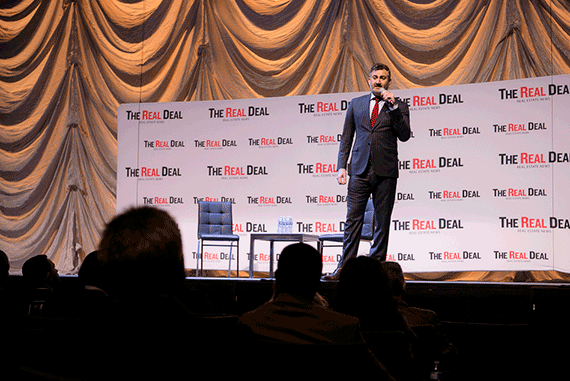
Amir Korangy introducing a Q&A with Dragon’s Den star, Michael Wekerle
J.D. Parker, director of the tri-state region at Marcus & Millichap, noted that Canadian institutional investors such as Ivanhoe Cambridge continue to grab headlines with big-ticket deals like the $5.3 billion acquisition of Stuyvesant Town, smaller Canadian players aren’t yet playing a role in the U.S. multifamily market. Fears of the headaches of rent regulation and the uncertainty of dealing with difficult tenants are a deterrent, he said.
Hiten Samtani, TRD’s managing web editor and the moderator of the panel, then asked a question about Donald Trump, and whether his divisive rhetoric would have an impact on foreign investment.

Attendees discuss Miami developments
El-Gamal, a Muslim developer whose 2010 plans for an Islamic center near the Ground Zero site thrust him into the national spotlight, said it was “embarrassing” that “such a divisive conversation” about race and identity was happening in 2016.
The Middle East remained a major investor in the U.S. real estate market, El-Gamal noted, telling the audience that he was disappointed that Trump had used his massive platform in such a manner.
Soper noted that Trump had talked about building a wall between the U.S. and Canada, which is by far the largest foreign real estate investor in New York. In that event, “we won’t bother coming anymore,” Soper said, to applause from the audience.
“I’m scouting for a second home in the event [Trump] wins,” Parker quipped. “[It] would be a good investment prior to him winning — which I don’t think it will happen.”
